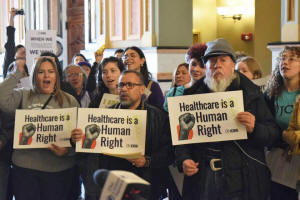State on track to end health coverage program for immigrant adults
[May 14, 2025]
By Peter Hancock
SPRINGFIELD — State officials are on track to shut down a program at the
end of June that provides publicly funded health care coverage to more
than 30,000 non-U.S. citizens in Illinois, including many who are in the
country without legal authorization.
A legislative oversight committee took no action Tuesday on a set of
administrative rules the Illinois Department of Healthcare and Family
Services adopted in March that will end the program, effective July 1 —
the first day of the next fiscal year.
Sen. Bill Cunningham, D-Chicago, cochair of the Joint Committee on
Administrative Rules, said the lack of action Tuesday means nothing has
changed about the plans to bring the program to an end.
“It (the rule) is in place now. It’s phasing out. JCAR hasn’t taken any
action on it,” Cunningham said in an interview after Tuesday’s meeting.
“I don’t think there’s anything to read into it beyond that.”
The Health Benefits for Immigrant Adults program, or HBIA, was launched
in 2021. It covers qualifying individuals aged 42-64. The program came
about as a companion to a program that began the year before, Health
Benefits for Immigrant Seniors, or HBIS, which covers about 8,900
individuals aged 65 and over.
Both programs were intended to provide health coverage to a segment of
the population that was ineligible for coverage under Medicaid solely
because of their immigration status. The programs cover those who are
not lawfully present in the United States as well as legal permanent
residents who have not been in the country long enough to receive
Medicaid benefits.
However, the two programs have far exceeded their original cost
estimates. According to an auditor general’s report released in
February, the total cost of both programs from Fiscal Year 2021 through
Fiscal Year 2024 was more than $1.6 billion.

And because the programs cover individuals who are not eligible for
traditional Medicaid – the public health insurance program for
low-income individuals that is jointly funded with state and federal
funds – nearly all the cost of those programs came exclusively from
state dollars.
With the state facing flattening revenues and a projected budget deficit
in the coming fiscal year, Gov. JB Pritzker proposed ending the HBIA
program effective July 1.
A notice on the program’s web page reads: “Due to State Fiscal Year 2026
budgetary constraints, the state had to make the difficult decision to
use the limited funding available to continue coverage for eligible
noncitizens aged 65+ only.”
In proposing to end the program, Pritzker noted the working-age adults
that it covers can get jobs with employer-sponsored health benefits.
[to top of second column]
|

A crowd gathers at the Illinois Capitol in February to urge state
lawmakers to continue to support pro-immigrant policies, including
Illinois’ programs for noncitizen health care. Gov. JB Pritzker’s
administration has proposed cutting one of the programs. (Capitol
News Illinois photo by Jade Aubrey)

The General Assembly’s revenue estimating group, the Commission on
Government Forecasting and Accountability, recently increased its
revenue estimate over its previous March projection by about $266
million. But COGFA’s latest forecast is still $471 million below the
governor’s February projection for baseline revenues, and Pritzker has
not backed down from his call for ending the HBIA program.
Andy Manar, his deputy governor for budget issues, was quoted in the
Chicago Tribune as saying as recently as last week that Pritzker remains
“firm” in his decision to cut the program, noting that cuts had to be
made in many state programs to balance next year’s budget.
But as lawmakers continue working to pass a final budget before the end
of May, Congress is considering other changes to the Medicaid program
that could have an even more profound impact on the state budget.
The U.S. House Energy and Commerce Committee, which has jurisdiction
over Medicare and Medicaid, began hearings Tuesday on a package of
spending recommendations that the Congressional Budget Office estimates
would reduce the federal deficit by more than $880 billion over the next
10 years.
Much of that, according to a summary of the recommendations, would come
from the Medicaid program and the Affordable Care Act, the 2010 health
insurance reform package also known as “Obamacare.”
Those recommendations include, among other things, requiring Medicaid
recipients to verify their income every six months instead of 12 months.
It also calls for withholding federal funds under Medicaid or the
Children’s Health Insurance Program for people who do not provide proof
of U.S. citizenship or satisfactory immigration status.
The package also calls for cutting by 10% the federal matching rate,
known as the Federal Medical Assistance Percentage, or FMAP, for states
that provide health care coverage under Medicaid or any other
state-based program for undocumented immigrants.
“It could have a dramatic effect, if it actually happens,” Cunningham
said of the total package of proposed cuts. “Obviously Medicaid is one
of the largest tranches in our budget and we depend on a lot of
reimbursement dollars from the federal government. If the federal
government goes ahead with those cuts, it would cause hundreds of
thousands of people in Illinois to lose their health insurance.”
Capitol News Illinois is
a nonprofit, nonpartisan news service that distributes state government
coverage to hundreds of news outlets statewide. It is funded primarily
by the Illinois Press Foundation and the Robert R. McCormick Foundation. |